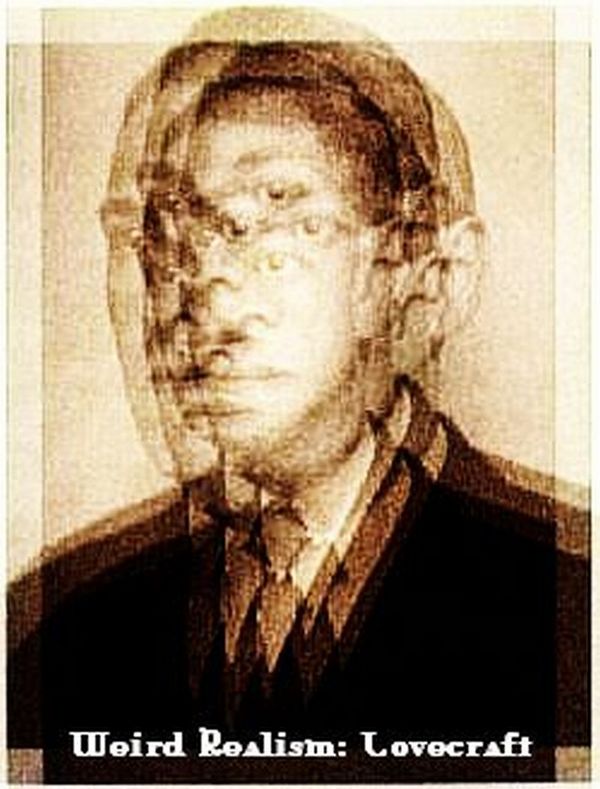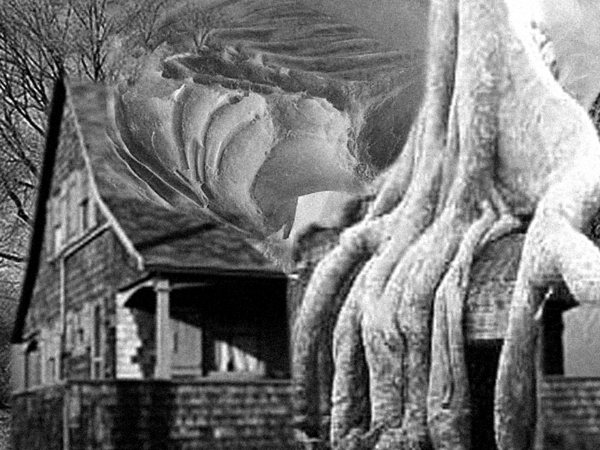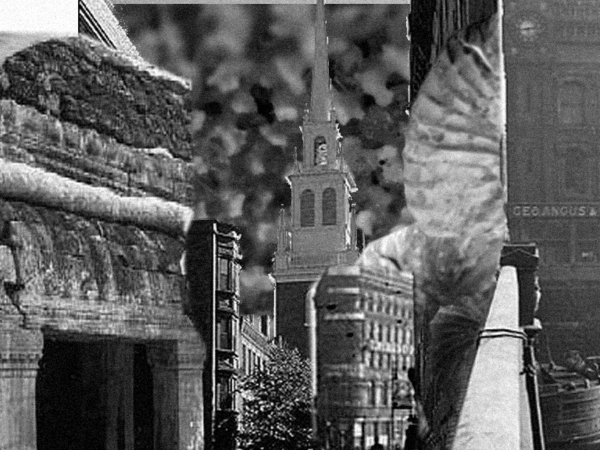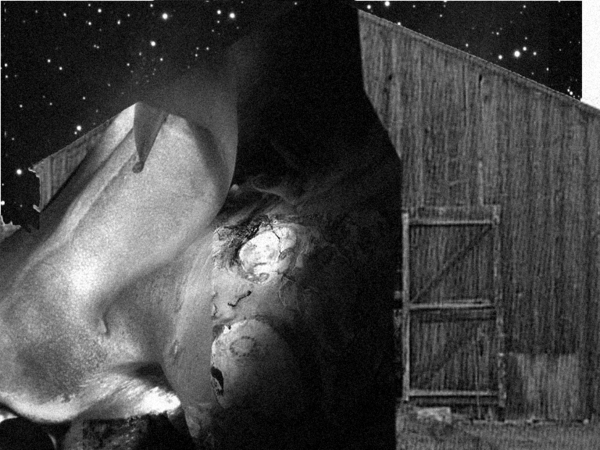May 02, 2007
Lovecraft and the Weird: Part I
(I wanted to complete my post on Lovecraft this week, but I now have to prepare for the Ballard conference at UEA this weekend. So I will present what I have done so far, more to follow next week...)
Thanks, then, to everyone who attended and participated in the Lovecraft: Weird Realism event last week at Goldsmiths. Particular thanks to those who led the discussions: Justin Woodman (whose reflections on the event can be found on his own blog), Dominic Fox, Ben Noys, China MiÚville, Nina Power and Graham Harman. Special thanks, also, to Nina and Daniel who laboured to produce the booklet given out on the day which contained all the essays. (See the excellent cover, above.) A mention, too, for Daniel Gall who travelled all the way from Germany to attend.
This post is illustrated with twelve collages specially made for the event by Ghost Box's Julian House. Sadly, due to an email glitch, I didn't receive the collages in time to use them on the day.
As Ben noted, the event was remarkable for staying focused on its official object. One of the best aspects of the day was that an attempt was made to actually work something out - it wasn't the usual empty rehearsal of pre-established positions.
It seemed to me that the most urgent theoretical task surrounding Lovecraft was to produce a viable definition of the Weird. There are well-known definitions - contested, naturally - of the Uncanny, the Fantastic and the Marvellous, but the Weird is a word awaiting a concept. I think that Dominic is right, however. The Weird still awaits a concept; the event did not come up with a definition sufficiently crisp to settle the issue.
In what follows, I will make no attempt to represent the full range of discussions that occurred last week. Rather the posts will be an attempt to integrate the discussions from last week into my ongoing reflections on HPL.
I've never been fully persuaded by Todorov's definition of the Fantastic as that which is suspended between the Uncanny (stories which ultimately resolve in a naturalistic way) and the Marvellous (stories which resolve supernaturalistically). Todorov's structural anaylsis clearly captures something, but I'm not convinced that 'the Fantastic' is the best name for the mode to which he refers.
In any case, Lovecraft could not be a writer of the Fantastic in Todorov's sense. Although his stories involve what he characterised, in 'Notes on Writing Weird Fiction' as 'the illusion of some strange suspension or violation of the galling limitations of time, space, and natural law which forever imprison us and frustrate our curiosity about the infinite cosmic spaces beyond the radius of our sight and analysis', there is never any suggestion of the involvement of supernatural beings. Human attempts to transform the alien entities into Gods are clearly regarded by Lovecraft as vain acts of anthropomorphism, perhaps noble but ultimately absurd efforts to impose Meaning and Sense on to an indifferent cosmos. As Robin Stevenson pointed out, the cults in Lovecraft are 'cargo cults', groups which hallucinate cosmic Meaning from meteorite fragments, screen memories of anomalous contact, and cultural debris.
We are never left wondering as to whether the stories will resolve naturalistically or supernaturalistically. Naturalism - the ordinary, empirical world of common sense and Euclidean geometries - will be shredded by the end of the tale, but it is replaced by a Hypernaturalism - an expanded sense of what the material cosmos contains - rather than a Supernaturalistic dualism.
Supsense is not a feature of Lovecraft's fiction - and this goes for the settling of the ontological question, 'what type of world is this?' as much as for the settling of the plot question, 'what is going to happen?' Once the reader has read one or two of Lovecraft's stories, they know perfectly well what to expect in the others. In fact, it is hard to believe that even when a reader encounters a Lovecraft story for the first time that they will be very surprised by how the tale turns out. Houellebecq observed that the reader is always ahead of the characters:'[o]ften when reading his stories, one wonders what the protagonists are taking so long to understand the nature of the problem menacing them. They appear, frankly, obtuse.' (55) (This discrepancy between the reader's experience and that of the characters may also mean that it is mistaken to conceive of Lovecraft as a Horror writer. Certainly, Lovecraft's characters feel Terror, but is this conveyed to the reader?)
If Lovecraft is not a writer of the Fantastic in Todorov's sense, is he perhaps in some other sense? Maurice LÚvy, who wrote Lovecraft: A Study in the Fantastic twenty years ago, clearly thought that he was. Yet, for all its merits, LÚvy's book declines to offer any definition of the Fantastic (in a footnote, LÚvy in fact defers that task to none other than Todorov), and he proceeds to fit Lovecraft into a 'Fantastic tradition' which includes the Gothic novels, Poe, Hawthorne and Bierce.
Is the Weird then a particular mode of the Fantastic? (It should be noted that Lovecraft himself happily equates the two terms in 'Notes on Writing Weird Fiction'). I don't think this is satisfactory. I would prefer to locate the Weird in opposition to the Fantastic. That is because I would define Fantasy, not as Todorov does, by its relation to naturalism and supernaturalism, but by its relation to Worlds. Fantasy - and here Dunsany, Lovecraft's early inspiration, as much as Tolkien, is exemplary - is set in Worlds that are entirely different from ours; or rather, locationally distant from ours (too many Fantasy worlds turn out to be all-too similar, ontologically and politically, to ours). The Weird, by contrast, is notable for the way in which it stages a conflict between this world and Others. There are of course cases of the Fantastic (C. S. Lewis's Narnia books, Stephen Donaldson, Baum's Oz) in which there is an egress between this world and another - yet in all those cases I think I am correct in saying that the journey is only one way. Characters from this world go into another world, but that Other world has no impact upon this one. With Lovecraft, there is an interplay, an exchange between this world and others.
LÚvy distinguishes Lovecraft from Dunsany in the following way:
- In Lovecraft, the space of fantasy is not to be confounded entirely with the space of dream. In this it differs entirely from the marvellous and redoubtable gulfs imagined by Lord Dunsany, which have the fragility of dreams. We walk there, and have strange encounters, but they vanish like soap bubbles in the sun as soon as we leave them. Pagana has no other existence than in the dreams of Mana-Yood-Sushai. For Lovecraft, however, dream is contained in the Beyond, but gives access to it. On waking the horror remains: Gilman convulsively holds tight in his hand the objet d'art that, made of a metal unknown on earth, testifies to the material reality of the spaces that he has visited.
The economy of the fantasy tale demands this realism. It is because the reader cannot reduce Gilman's adventures to the dimensions of a simple nightmare that the bizarre enters. (50-51)
I agree with LÚvy that the congress between this world and Others is crucial to Lovecraft - but this is precisely why I would abandon the term 'fantastic' in relation to Lovecraft's work. LÚvy insists, rightly, on the supreme significance of Lovecraft setting so many of his stories in New England. Lovecraft's New England, LÚvy writes, is a world whose 'reality - physical, topographical, historical - should be emphasised. It is well known that the truly fantastic exists only where the impossible can make an irruption, through time and space, into an objectively familiar locale.' (36-37) LÚvy's idea of a space in which 'the impossible can make an irruption' is a nice definition of Lacanian fantasy as the encounter with the Impossible-Real, yet I believe that the term 'Fantasy' is too compromised by its associations with worlds that are entirely Other (locationally, if not in terms of their empirical or political features, which too often bear rather too close a relationshp to their counterparts in this world) to be useful.
What I propose, then, is that in his break from Dunsany, Lovecraft ceased to be a Fantasy writer and became a writer of the Weird. A first characteristic of the Weird, at least in Lovecraft's version it, would be - to borrow LÚvy's phrase - a fiction in which 'the impossible can make an irruption, through time and space, into an objectively familiar locale'.
Here we can see the necessary relationship between realism and the Weird. In a characterstic piece of overstatement, Houellebecq argues that '[t]he rejection of all forms of realism is a preliminary condition for entering his universe.' (57) Lovecraft himself often wrote disdainfully of realism. But if Lovecraft had entirely rejected realism, he would never have emerged from the Fantasy realms of Dunsany and De La Mare. It would be closer to the mark to say that Lovecraft contained or localised realism. In a letter of 1927, he makes this explicit:
- Only the human scenes and characters must have human qualities. These must be handled with unsparing realism, (not catch-penny romanticism) but when we cross the line to the boundless and hideous unknown - the shadow-haunted Outside - we must remember to leave our humanity and terrestrialism at the threshold.
Lovecraft's tales depend for their power on the contrast between the terrestrial-empirical and the Outside. That is why they are almost always written in the first person ('The Dunwich Horror' is the most famous exception to this rule): if the Outside gradually encroaches upon a human subject, its alien contours can be appreciated; whereas to attempt to to capture 'the boundless and hideous unknown' without any reference to the human world at all is to risk banality. At the same time, Houellebecq is correct to emphasise that, by contrast with someone like Richard Matheson, Lovecraft has 'no wish to spend thirty or even three pages describing an average American family.' (51-52) Lovecraft deploys the human world in as formulaic and perfunctory way, for much the same reason that a painter of a vast edifice might insert a standard human figure standing before it: to provide a sense of scale.
Posted by mark at May 2, 2007 11:48 PM | TrackBack


